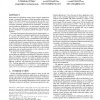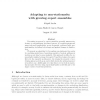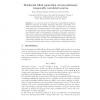383 search results - page 1 / 77 » Exploiting nonstationarity for performance prediction |
EUROSYS
2007
ACM
14 years 2 months ago
2007
ACM
Real production applications ranging from enterprise applications to large e-commerce sites share a crucial but seldom-noted characteristic: The relative frequencies of transactio...
CORR
2011
Springer
13 years 13 days ago
2011
Springer
Forecasting sequences by expert ensembles generally assumes stationary or near-stationary processes; however, in complex systems and many real-world applications, we are frequentl...
ESANN
2007
13 years 6 months ago
2007
In a previous work, we developed a quasi-efficient maximum likelihood approach for blindly separating stationary, temporally correlated sources modeled by Markov processes. In this...
IPPS
2007
IEEE
13 years 11 months ago
2007
IEEE
— Modern CPUs operate at GHz frequencies, but the latencies of memory accesses are still relatively large, in the order of hundreds of cycles. Deeper cache hierarchies with large...
ICA
2004
Springer
13 years 10 months ago
2004
Springer
Abstract. In this paper we present an efficient real-time implementation of a broadband algorithm for blind source separation (BSS) of convolutive mixtures. A recently introduced m...



